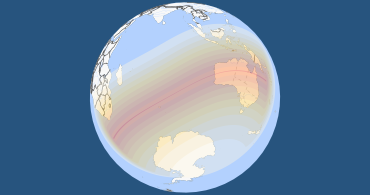Feb 16, 1999 at 7:08 am
Max View in West Point
| Global Event: | Annular Solar Eclipse |
|---|---|
| Local Type: | Annular Solar Eclipse, in West Point |
| Began: | Tue, Feb 16, 1999 at 6:02 am |
| Maximum: | Tue, Feb 16, 1999 at 7:08 am 0.991 Magnitude |
| Ended: | Tue, Feb 16, 1999 at 8:21 am |
| Duration: | 2 hours, 19 minutes |
| Annularity: | 1 minute, 5 seconds |
All times shown on this page are local time. | |

Protect Your Eyes! Find out how to safely watch solar eclipses here
Never look directly at the Sun without proper eye protection. You can seriously hurt your eyes, and even go blind… read more
Eclipses and Transits Visible in West Point
| Eclipse Visibility From West Point | Visibility Worldwide | ||
|---|---|---|---|
| Feb 9–10, 1990 Total Lunar Eclipse | Total Lunar Eclipse |  | |
| Aug 6, 1990 Partial Lunar Eclipse | Partial Lunar Eclipse |  | |
| Jun 27, 1991 Penumbral Lunar Eclipse | Penumbral Lunar Eclipse |  | |
| Jul 26, 1991 Penumbral Lunar Eclipse | Penumbral Lunar Eclipse |  | |
| Jun 15, 1992 Partial Lunar Eclipse | Partial Lunar Eclipse |  | |
| Jun 30, 1992 Partial Solar Eclipse | Total Solar Eclipse |  | |
| Dec 9–10, 1992 Total Lunar Eclipse | Total Lunar Eclipse |  | |
| Jun 4, 1993 Partial Lunar Eclipse | Total Lunar Eclipse |  | |
| Nov 6, 1993 Mercury Transit | Mercury Transit |  | |
| May 25, 1994 Partial Lunar Eclipse | Partial Lunar Eclipse |  | |
| Nov 3, 1994 Partial Solar Eclipse | Total Solar Eclipse |  | |
| Oct 8, 1995 Penumbral Lunar Eclipse | Penumbral Lunar Eclipse |  | |
| Apr 3–4, 1996 Total Lunar Eclipse | Total Lunar Eclipse |  | |
| Sep 27, 1996 Total Lunar Eclipse | Total Lunar Eclipse |  | |
| Mar 24, 1997 Partial Lunar Eclipse | Partial Lunar Eclipse |  | |
| Sep 16, 1997 Total Lunar Eclipse | Total Lunar Eclipse |  | |
| Mar 13, 1998 Penumbral Lunar Eclipse | Penumbral Lunar Eclipse |  | |
| Aug 8, 1998 Penumbral Lunar Eclipse | Penumbral Lunar Eclipse |  | |
| Jan 31, 1999 Penumbral Lunar Eclipse | Penumbral Lunar Eclipse |  | |
| Feb 16, 1999 Annular Solar Eclipse | Annular Solar Eclipse |  | |
Note: Click on the date link for details in West Point, or the path map image for global details. Currently shown eclipse is highlighted. | |||
Next annular eclipse visible in West Point


